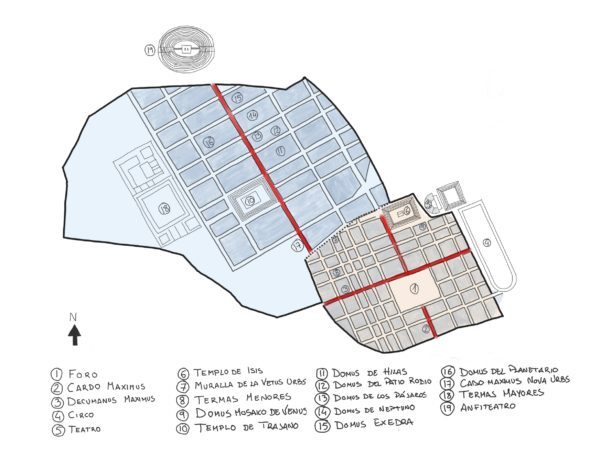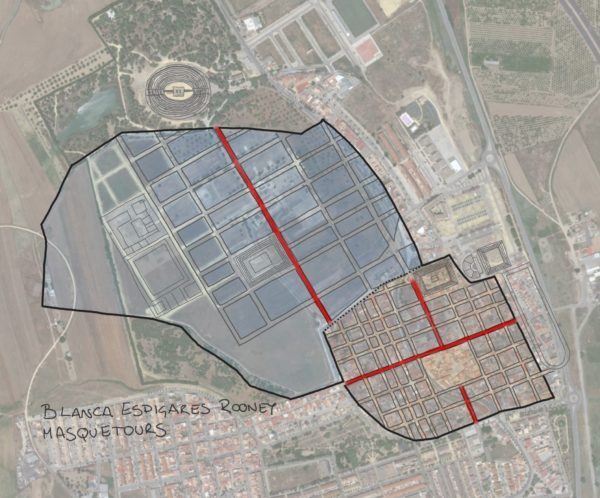
Just at this very moment, I don’t understand why my mind is remembering my childhood in Italica. I haven’t thought about it in a very long time. Not even a minute during these two years in Germania (1). And now everything, even details which were hazy, are coming to me like vivid memories.
In the summer mornings, the smell of bread woke me up before dawn’s first light. It is like I could feel the coolness of that limestone mortar floor in my feet again, while I was, still sleepy, putting on my toga praetexta (2). Then I sneaked out from my bedroom straight to the kitchen, where the slaves were taking out those big loaves from the oven. I can still feel the freshness of the perystilium where my room was (3). Early in the morning it was still chilly and nice. Later, we needed to find the coolest rooms with the best air flow to spend the hot day. The central fountain had a big beautiful fish pouring out the water. And it was all surrounded by acantum and myrtle. It was a lovely house, close to the forum and right in the cardus maximus. And one of the biggest in Italica. Dara was waiting for me as always. She had already sliced a piece from the loaf, so I could take it and run away out of Italica. I needed to do this before the salutatio. My father always wanted me beside him during this ritual every sunrise.

At that time this bored me to death. All these people coming to pay their respects to my father. Now I understand the importance of the salutatio (4) to keep the healthy relationship between social classes. My father had always this long line outside. Our domus guard (the atriensis (5)) used to place benches on the street so people could wait comfortably. Each client crossed the atrium to find my father and me in the room (cubiculum) where the reception was placed. During this continuous activity of people coming in and out, the slaves were taking out water from the atrium well to start cleaning the domus and cooking. From the cubiculum where we were during the salutatio, I could hear once and again the splash of the bucket in the water of the big cistern underneath the impluvium. Sometimes I wasn’t paying attention to the ritual and I was more into counting the splashes.
My little morning walk needed to be done before dawn, because my father needed to go to the forum after the sunrise. He liked the salutatio but he also protected all his clients very well. Responsibility and dignity, the most important virtues, he used to say. I wish he was alive to see me entering as an emperor in the most magnificent city in the world: Rome. And the first one to be born outside the region of Italy. In some way I know the Gods told him I was going to be the one.


Nevertheless, when I was a kid I wasn’t interested in this things. I always wanted to escape from home to run into the countryside and take a bath in the river. I could only do this really early and that is why the smell of the bread was my alarm clock. Italica was surrounded by endless fields of wheat. I loved to walk down the decumanus maximus to the gate and go slope down crossing these fields. A tributary from the Betis (old name for river Guadalquivir) was in front of Italica. A little one. Enough for a quick bath. The view from there was beautiful: that huge fertile valley, crossed by this enormous and sacred river Betis. No wonder why Cornelio Escipión decided to found Italica here.
It is surprising that these old memories are comforting me today. It is maybe that here, outside Rome, the smell of loaves this morning woke me up and for an instant I felt I was back at home. Rome in front of where I stand, is waiting to welcome me. I don’t know if Nerva was reckless choosing me. I know that patricians are not very happy having a foreigner as the emperor. But the only thing I know is that even though I wasn’t born in Italy, I will be one of the best emperors (6) Rome has ever had, and I will build the most impressive architecture ever, to honor the grandeur of this empire.
(1) Trajan was declared emperor while he was in Germania stabilizing the situation there. He decided not to go immediately to Rome and stay there to be sure that the area was under control. (2) Toga praetexta was a circular cloth that was used by senators and kids and adolescents until sixteen years old. (3) There were different kind of dwellings: insulae, domus and villa. The domus, the Roman traditional house for the upper classes. https://www.khanacademy.org/humanities/ancient-art-civilizations/roman/beginners-guide-rome/a/roman-domestic-architecture-domus (4) The salutatio was a ceremonial visit in which prominent citizens received their “clients”, who would bring him news and ask for favors or were asked to return favors. And clients were from all levels of society. (5) The atriensis was the one in charge to look after the entrance to the domus, to the atrium and in charge of the household of the house. Usually he was a slave. (6) Trajan was the second of the so called “Five Good Emperors”. Under his rule, the Roman Empire got the biggest extension. He also left an important urban and architectonic heritage.